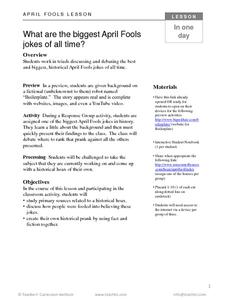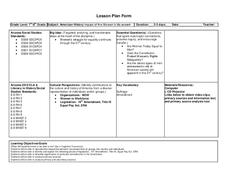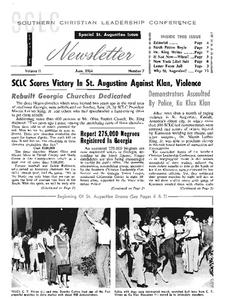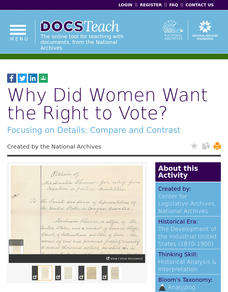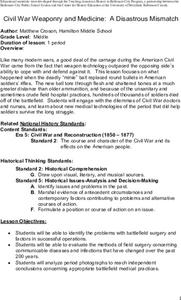TCI
What Are the Biggest April Fools Jokes of All Time?
After working in groups to analyze primary sources related to a historical hoax, learners will discuss how people managed to be fooled and work to identify one of the biggest April Fools jokes in history.
Arizona Department of Education
American History Impact of the Women’s Movement
Take a look at important images that depict the women's suffrage movement, the support for the Equal Rights Amendment, and wage equity for women over the last two centuries. As class members work through a instructional activity on...
Center for History and New Media
The Daily Experience of the Laurel Grove School, 1925
What was daily life like for those attending segregated schools in 1925? Modern learners fill out a KWHL chart as they explore historical background and primary source documents about the Laurel Grove School in Fairfax County, Virginia....
Civil War Trust
Civil War Soldier: Experiencing the Battle of Franklin
Fighting a war over home soil makes a living nightmare even more real. Class members describe the experience of a Civil War soldier during the Battle of Franklin, poised right at a major turning point of the war, after researching the...
DocsTeach
Patent Analysis: Alexander Graham Bell's Telephone
Believe it or not, the plugs and wires on Alexander Graham Bell's patent application for telegraph improvements has a direct connection to devices today. Young historians examine the fine details of the patent application. After they...
Curated OER
A Colony is Born : Lesson 5 - Dear Mem
Discover colonies! Young historians will listen to a primary source journal entry read aloud with a backdrop of wave sounds. They discuss the entry, add historical facts to a chart and personal insights to another. Then they listen to...
Roy Rosenzweig Center for History and New Media
Rosa Parks and the Montgomery Bus Boycott
Participants examine two documents related to Rosa Parks and the bus boycott, sources that challenge some of the commonly held preconceptions about Rosa Parks. They then respond to discussion questions to reinforce understanding and...
Simon & Schuster
A Teacher's Guide to 1776 by David McCullough
David McCullough's Pulitzer Prize-winning novel, 1776, is the focus of a 28-page teacher's guide. The guide includes pre-reading questions, background information about key British and American figures, and chapter-by-chapter lessons.
K12 Reader
Two Viewpoints of the Same Event: Lee Surrenders to Grant, 1865
How did Union General Ulysses S. Grant view the surrender of Confederate General Robert E. Lee in 1865, which effectively ended the United States Civil War? After reading an excerpt from Grant's autobiography, your young historians will...
Middle Tennessee State University
The Invention of the Telephone
All of the people in your class would agree that life would be different without the invention of the telephone! Study Alexander Graham Bell's most famous and influential invention through the primary source document of his sketch of the...
National WWII Museum
“My Dear Little Boys…” Interpreting a letter home from the war
Letters have long been prized by historians as primary sources for what they reveal not only about events but also about the emotional responses of the writers to these events. "My Dear Little Boys," a letter written by Leonard Isacks on...
Freedom Archives
Special St. Augustine Issue
The articles and images in the June 1964 edition of the Southern Christian Leadership Conference Newsletter detail the events in St. Augustine that were instrumental in the passing of the Civil Rights Act of 1964. The stirring images and...
New York State Education Department
US History and Government Examination: August 2013
While the United States is now one of the strongest countries in the world, at its founding, it was plagued by controversies over the ratification of the Constitution, the Louisiana Purchase, and the expansion of slavery. Using a...
American Battlefield Trust
1861: The Country Goes to War
What was it like to know the Civil War was coming? Using a graphic timeline activity and excerpts of speeches from Abraham Lincoln and Jefferson Davis, learners consider the early days of the conflict. The resource includes prompts for...
American Battlefield Trust
1862: Antietam and Emancipation
Was the Emancipation Proclamation a revolutionary document or just a military strategy? It proclaimed that all those enslaved in Confederate states would be "forever free." Logistically, though, it did little. The order, however,...
K20 LEARN
Give Me Liberty or Give Me Death: The Journey to Revolution
The words of "Common Sense" and Patrick Henry's "Give me liberty or give me death!" speech ring throughout history. Scholars explore the nuances of each patriot's argument using excerpts from the famous pamphlet and speech and a recorded...
DocsTeach
Why Did Women Want the Right to Vote?
No taxation without representation may have been the battle cry of the American Revolution, but women used the same argument when demanding their right to vote in the late 1800 and early 1900s. Young historians examine petitions from...
Center for History Education
Lincoln and the Republicans: The Cause of the War?
In today's political rhetoric, many forget the pivotal role the Republican Party played in the causes of the Civil War. The party's formation was the final straw for Southerners who saw the enslavement of people of African descent a...
Center for History Education
Civil War Weaponry and Medicine: A Disastrous Mismatch
Ironically, science was the reason why the Civil War was so deadly. Despite the use of medical practices now considered barbaric—such as conducting surgery with bare, dirty hands—developments in weaponry meant that more men died on and...
West Virginia Department of Education
Harpers Ferry Letters
Scholars write letters as if they were someone who heard the story of John Brown's raid. The resource, a standalone, covers information from primary sources that is important to West Virginian history: the Harpers Ferry Letters.
Curated OER
Slave Narratives: Constructing U.S. History Through Analyzing Primary Sources
Learners access oral histories that contain slave narratives from the Library of Congress. They describe the lives of former slaves, sample varied individual experiences and make generalizations about their research in journal entries.
American Battlefield Trust
Antietam 360
It was the single bloodiest day in Civil War history. Now, class members have the opportunity to walk in the footsteps of soldiers who fought in the Battle of Antietam using an interactive website. Supplemental resources include...
Center for History Education
Women's Rights in the American Century
Today, many young people find it hard to understand why it took over 150 years for women in the United States to get the right to vote—why there was even a need for the suffrage movement. As they read a series of primary source...
Daughters of the American Revolution
Lesson 1: How Do Society’s Expectations Influence Education?
The history of women's education can be traced back to the delicate stitching of student samplers from the 19th century. Modern-day pupils examine and analyze four primary sources, three of which are images of embroidered samplers, which...
Other popular searches
- Using Primary Sources
- Wwi, Primary Sources
- Rosa Parks Primary Documents
- Gilded Age Primary Sources
- Working With Primary Sources
- Primary Resources Hsie
- Web Quests Primary Sources
- Ancient Rome Primary Sources
- 1920 1929 Primary Sources
- Primary Sources and Family
- Conscription Primary Sources
- Scotland Primary Sources


